- Home
- Robin Hobb
Farseer 2 - Royal Assassin
Farseer 2 - Royal Assassin Read online
T H E F A R S E E R 3
ROYAL
ASSASIN
Robin Hobb
PROLOGUE
Dreams and Awakenings
WHY IS IT forbidden to write down specific knowledge of the magics? Perhaps because we all fear that such knowledge would fall into the hands of one not worthy to use it. Certainly there has always been a system of apprenticeship to ensure that specific knowledge of magic is passed only to those trained and judged worthy of such knowledge. While this seems a laudable attempt to protect us from unworthy practitioners of arcane lore, it ignores the fact that the magics are not derived from this specific knowledge. The predilection for a certain type of magic is either inborn or lacking. For instance, the ability for the magics known as the Skill is tied closely to blood relationship to the royal Farseer line, though it may also occur as a "wild strain " among folk whose ancestors came from both the inland tribes and the Outislanders. One trained in the Skill is able to reach out to another's mind, no matter how distant, and know what he is thinking. Those who are strongly Skilled can influence that thinking, or have converse with that person. For the conducting of a battle, or the gathering of information, it is a most useful tool.
Folklore tells of an even older magic, much despised now, known as the Wit. Few will admit a talent for this magic, hence it is always said to be the province of the folk in the next valley, or the ones who live on the other side of the far ridge. I suspect it was once the natural magic of those who lived on the land as hunters rather than as settled folk; a magic for those who felt kinship with the wild beasts of the woods. The Wit, it is said, gave one the ability to speak the tongues of the beasts. It was also warned that those who practiced the Wit too long or too well became whatever beast they had bonded to. But this may be only legend.
There are the Hedge magics, though I have never been able to determine the source of this name. These are magics both verified and suspect, including palm reading, water gazing, the interpretation of crystal reflections, and a host of other magics that attempt to predict the future. In a separate unnamed category are the magics that cause physical effects, such as invisibility, levitation, giving motion or life to inanimate objects-all the magics of the old legends, from the Flying Chair of the Widow's Son to the North Wind's Magic Tablecloth. I know of no people who claim these magics as their own. They seem to be solely the stuff of legend, ascribed to folk living in ancient times or distant places, or beings of mythical or near-mythical reputation: dragons, giants, the Elderlings, the Others, pecksies.
I pause to clean my pen. My writing wanders from spidery to blobbish on this poor paper. But I will not use good parchment for these words; not yet. I am not sure they should be written. I ask myself, why put this to paper at all? Will not this knowledge be passed down by word of mouth to those who are worthy? Perhaps. But perhaps not. What we take for granted now, the knowing of these things, may be a wonder and a mystery someday to our descendants.
There is very little in any of the libraries on magic. I work laboriously, tracing a thread of knowledge through a patchwork quilt of information. I find scattered references, passing allusions, but that is all. I have gathered it, over these last few years, and stored it in my head, always intending to commit my knowledge to paper. I will put down what I know from my own experience, as well as what I have ferreted out. Perhaps to provide answers for some other poor fool, in times to come, who might find himself as battered by the warring of the magics within him as I have been.
But when I sit down to the task, I hesitate. Who am I to set my will against the wisdom of those who have gone before me? Shall I set down in plain lettering the methods by which a Witgifted one can expand her range, or can bond a creature to himself? Shall I detail the training one must undergo before being recognized as a Skilled one? The Hedge wizardries and legendary magics have never been mine. Have I any right to dig out their secrets and pin them to paper like so many butterflies or leaves collected for study?
I try to consider what one might do with such knowledge, unjustly gained. It leads me to consider what this knowledge has gained for me. Power, wealth, the love of a woman? I mock myself. Neither the Skill nor the Wit has ever offered any such to me. Or if they did, I had not the sense nor ambition to seize them when offered.
Power. I do not think I ever wanted it for its own sake. I thirsted for it, sometimes, when I was ground down, or when those close to me suffered beneath ones who abused their powers. Wealth. I never really considered it. From the moment that I, his bastard grandson, pledged myself to King Shrewd, he always saw that all my needs were fulfilled. I had plenty to eat, more education than I sometimes cared for, clothes both simple and those annoyingly fashionable, and often enough a coin or two of my own to spend. Growing up in Buckkeep, that was wealth enough and more than most boys in Buckkeep Town could claim. Love? Well. My horse Sooty was fond enough of me, in her own placid way. I had the truehearted loyalty of a hound named Nosy, and that took him to his grave. I was given the fiercest of loves by a terrier pup, and it was likewise the death of him. I wince to think of the price willingly paid for loving me.
Always I have possessed the loneliness of one raised amid intrigues and clustering secrets, the isolation of a boy who cannot trust the completeness of his heart to anyone. I could not go to Fedwren, the court scribe, who praised me for my neat lettering and well-inked illustrations, and confide that I was already apprenticed to the royal assassin, and thus could not follow his writing trade. Nor could I divulge to Chade, my master in the Diplomacy of the Knife, the frustrating brutality I endured trying to learn the ways of the Skill from Galen the Skill Master. And to no one did I dare speak openly of my emerging proclivity for the Wit, the ancient beast magic, said to be a perversion and a taint to any who used it.
Not even to Molly.
Molly was that most cherished of items: a genuine refuge. She had absolutely nothing to do with my day-to-day life. It was not just that she was female, though that was mystery enough to me. I was raised almost entirely in the company of men, bereft not only of my natural mother and father, but of any blood relations that would openly acknowledge me. As a child, my care was entrusted to Burrich, the gruff stablemaster who had once been my father's right-hand man. The stable hands and the guards were my daily companions. Then as now, there were women in the guard companies, though not so many then as now. But like their male comrades, they had duties to perform, and lives and families of their own when they were not on watch. I could not claim their time. I had no mother, nor sisters or aunts of my own. There were no women who offered me the special tenderness said to be the province of women.
None save Molly.
She was but a year or two older than myself, and growing the same way a sprig of greenery forces its way up through a gap in the cobblestones. Neither her father's near-constant drunkenness and frequent brutality nor the grinding chores of a child trying to maintain the pretense of both home and family business could crush her. When I first met her, she was as wild and wary as a fox cub. Molly Nosebleed she was called among the street children. She often bore the marks of the beatings her father gave her. Despite his cruelty, she cared for him. I never understood that. He would grumble and berate her even as she tottered him home after one of his binges and put him to bed. And when he awoke, he never had any remorse for his drunkenness and harsh words. There were only more criticisms: Why hadn't the chandlery been swept and fresh strewing herbs put on the floor? Why hadn't she tended the beehives, when they were nearly out of honey to sell? Why had she let the fire go out under the tallow pot? I was mute witness more times than I care to remember.
But through it all, Molly grew. She flowered, one sudden summer, into a
young woman who left me in awe of her capable ways and womanly charms. For her part, she seemed totally unaware of how her eyes could meet mine and turn my tongue to leather in my mouth. No magic I possessed, no Skill, no Wit, was proof against the accidental touch of her hand against mine, nor could defend me against the awkwardness that overwhelmed me at the quirk of her smile.
Should I catalog her hair flowing with the wind, or detail how the color of her eyes shifted from dark amber to rich brown depending on her mood and the color of her gown? I would catch a glimpse of her scarlet skirts and red shawl among the market throng, and suddenly be aware of no one else. These are magics I witnessed, and though I might set them down on paper, no other could ever work them with such skill.
How did I court her? With a boy's clumsy gallantries, gaping after her like a simpleton watching the whirling disks of a juggler. She knew I loved her before I did. And she let me court her, although I was a few years younger than she, and not one of the town boys and possessed of small prospects as far as she knew. She thought I was the scribe's errand boy, a part-time helper in the stables, a Keep runner. She never suspected I was the Bastard, the unacknowledged son that had toppled Prince Chivalry from his place in the line of succession. That alone was a big enough secret. Of my magics and my other profession, she knew nothing.
Maybe that was why I could love her.
It was certainly why I lost her.
I let the secrets and failures and pains of my other lives keep me too busy. There were magics to learn, secrets to ferret out, men to kill, intrigues to survive. Surrounded by them, it never occurred to me that I could turn to Molly for a measure of the hope and understanding that eluded me everywhere else.
She was apart from these things, unsullied by them. I carefully preserved her from any touch of them. I never tried to draw her into my world. Instead, I went to hers, to the fishing and shipping port town where she sold candles and honey in her shop, and shopped in the market, and, sometimes, walked on the beaches with me. To me, it was enough that she existed for me to love. I did not even dare to hope she might return that feeling.
There came a time when my training in the Skill ground me into a misery so deep I did not think I could survive it. I could not forgive myself for being unable to learn it; I could not imagine that my failure might not matter to others. I cloaked my despair in surly withdrawal. I let the long weeks pass, and never saw her or even sent her word that I thought of her. Finally, when there was no one else that I could turn to, I sought her. Too late. I arrived at the Beebalm Chandlery in Buckkeep Town one afternoon, gifts in hand, in time to see her leaving. Not alone. With Jade, a fine broad-chested seaman, with a bold earring in one ear and the sure masculinity of his superior years. Unnoticed, defeated, I slunk away and watched them walk off arm in arm. I watched her go, and I let her go, and in the months that followed, I tried to convince myself that my heart had let her go as well. I wonder what would have happened if I had run after them that afternoon, if I had begged one last word of her. Odd, to think of so many events turning upon a boy's misplaced pride and his schooled acceptance of defeats. I set her out of my thoughts, and spoke of her to no one. I got on with my life.
King Shrewd sent me as his assassin with a great caravan of folk going to witness the pledging of the Mountain Princess Kettricken as Prince Verity's bride. My mission was to quietly cause the death of her older brother, Prince Rurisk, subtly of course, so that she would be left the sole heir to the Mountain throne. But what I found when I arrived there was a web of deceit and lies engineered by my youngest uncle, Prince Regal, who hoped to topple Verity from the line of succession and claim the Princess as his own bride. I was the pawn he would sacrifice for this goal; and I was the pawn who instead toppled the game pieces around him, bringing his wrath and vengeance down on myself, but saving the crown and the Princess for Prince Verity. I do not think this was heroism. Nor do I think it was petty spite wreaked on one who had always bullied and belittled me. It was the act of a boy becoming a man, and doing what I had sworn to do years before I comprehended the cost of such an oath. The price was my healthy young body, so long taken for granted.
Long after I had defeated Regal's plot, I lingered in a sickbed in the Mountain Kingdom. But finally a morning came when I awoke and believed that my long illness was finally over. Burrich had decided I was recovered enough to begin the long journey back home to the Six Duchies. Princess Kettricken and her entourage had left for Buckkeep weeks before, when the weather was still fine. Now winter snows already smothered the higher parts of the Mountain Kingdom. If we did not leave Jhaampe soon, we would be forced to winter there. I was up early that morning, doing my final packing, when the first small tremors began. Resolutely, I ignored them. I was just shaky, I told myself, with not having eaten breakfast yet, and the excitement of the journey home. I donned the garments that Jonqui had furnished for our winter journey through the Mountains and across the plains. For me there was a long red shirt, padded with wool quilted into it. The quilted trousers were green, but embroidered with red at the waist and cuffs. The boots were soft, almost shapeless until my feet were laced inside them. They were like sacks of soft leather, padded with sheared wool and trimmed with fur. They fastened to the feet with long wrappings of leather strips. My trembling fingers made tying them a difficult task. Jonqui had told us they were wonderful for the dry snow of the mountains, but to beware of getting them wet.
There was a looking glass in the room. At first, I smiled at my reflection. Not even King Shrewd's fool dressed as gaily as this. But above the bright garments, my face was thin and pale, making my dark eyes too large, while my fever-shorn hair, black and bristly, stood up like a dog's hackles. My illness had ravaged me. But I told myself I was finally on my way home. I turned aside from the mirror. As I packed the few small gifts I had selected to take home to my friends, the unsteadiness grew in my hands.
For the last time Burrich, Hands, and I sat down to break fast with Jonqui. I thanked her once again for all she had done toward healing me. I picked up a spoon for the porridge, and my hand gave a twitch. I dropped it. I watched the silvery shape fall and fell after it.
The next thing I remember is the shadowy corners of the bedroom. I lay for a long time, not moving or speaking. I went from a state of emptiness to knowing I had had another seizure. It had passed; both body and mind were mine to command once more. But I no longer wanted them. At fifteen years old, an age when most were coming into their full strength, I could no longer trust my body to perform the simplest task. It was damaged, and I rejected it fiercely. I felt savagely vindictive toward the flesh and bone that enclosed me, and wished for some way to express my raging disappointment. Why couldn't I heal? Why hadn't I recovered?
"It's going to take time, that's all. Wait until half a year has passed since the day you were damaged. Then assess yourself." It was Jonqui the healer. She was sitting near the fireplace, but her chair was drawn back into the shadows. I hadn't noticed her until she spoke. She rose slowly, as if the winter made her bones ache, and came to stand beside my bed.
"I don't want to live like an old man."
She pursed her lips. "Sooner or later you will have to. At least, I so wish that you will survive that many years. I am old, and so is my brother King Eyod. We do not find it so great a burden."
"I should not mind an old man's body if the years had earned it for me. But I can't go on like this."
She shook her head, puzzled. "Of course you can. Healing is tedious sometimes, but to say that you cannot go on ... I do not understand. It is, perhaps, a difference in our languages?"
I took a breath to speak, but at that moment Burrich came in. "Awake? Feeling better?"
"Awake. Not feeling better," I grumbled. Even to myself, I sounded like a fretful child. Burrich and Jonqui exchanged glances over me. She came to the bedside, patted my shoulder, and then left the room silently. Their obvious tolerance was galling, and my impotent anger rose like a tide. "Why can't you he
al me?" I demanded of Burrich.
He was taken aback by the accusation in my question. "It's not that simple," he began.
"Why not?" I hauled myself up straight in the bed. "I've seen you cure all manner of ailments in beasts. Sickness, broken bones, worms, mange ... you're stablemaster, and I've seen you treat them all. Why can't you cure me?"
"You're not a dog, Fitz," Burrich said quietly. "It's simpler with a beast, when it's seriously ill. I've taken drastic measures, sometimes, telling myself, well, if the animal dies, at least it's not suffering anymore, and this may heal it. I can't do that with you. You're not a beast."
"That's no answer! Half the time the guards come to you instead of the healer. You took the head of an arrow out of Den. You laid his whole arm open to do it! When the healer said that Greydin's foot was too infected and she'd have to lose it, she came to you, and you saved it. And all the time the healer was saying the infection would spread and she'd die and it would be your fault."
Burrich folded his lips, quelling his temper. If I'd been healthy, I'd have been wary of his wrath. But his restraint with me during my convalescence had made me bold. When he spoke, his voice was quiet and controlled. "Those were risky healings, yes. But the folk who wanted them done knew the risks. And," he said, raising his voice to cover the objection I'd been about to utter, "they were simple things. I knew the cause. Take out the arrowhead and haft from his arm and clean it up. Poultice and draw the infection from Greydin's foot. But your sickness isn't that simple. Neither Jonqui nor I really know what's wrong with you. Is it the aftermath of the poison Kettricken fed you when she thought you had come to kill her brother? Is this the effects of the poisoned wine that Regal arranged for you? Or is it from the beating you took afterward? From being near drowned? Or did all those things combine to do this to you? We don't know, and so we don't know how to cure you. We just don't know."

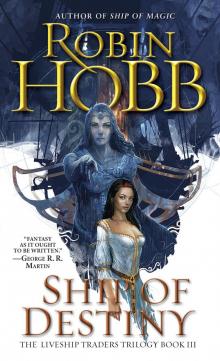 Ship of Destiny
Ship of Destiny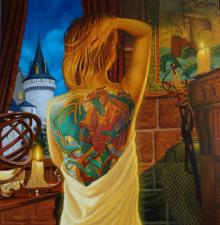 Golden Fool
Golden Fool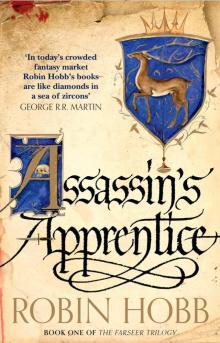 Assassins Apprentice
Assassins Apprentice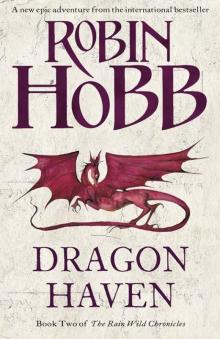 The Dragon Keeper
The Dragon Keeper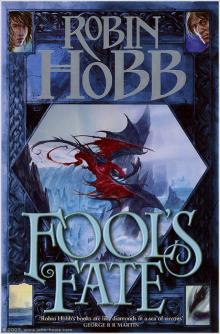 Fools Fate
Fools Fate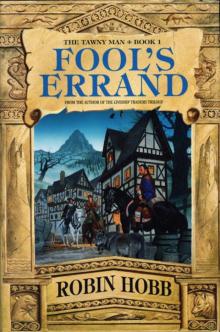 Fools Errand
Fools Errand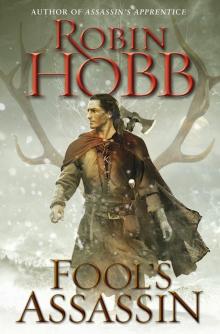 Fools Assassin
Fools Assassin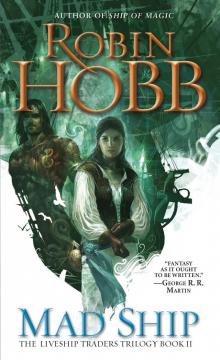 The Mad Ship
The Mad Ship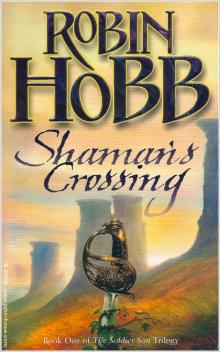 Shamans Crossing
Shamans Crossing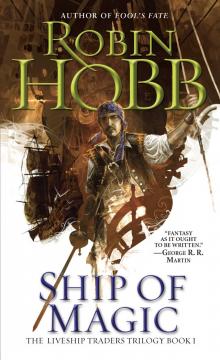 Ship of Magic
Ship of Magic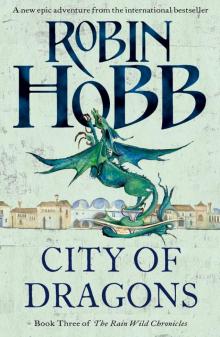 City of Dragons
City of Dragons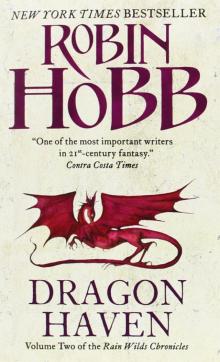 Dragon Haven
Dragon Haven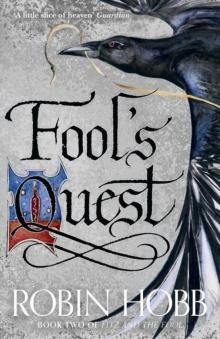 Fools Quest
Fools Quest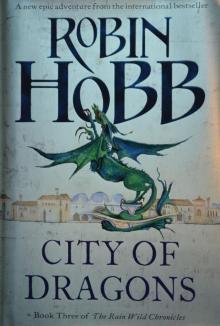 Blood of Dragons
Blood of Dragons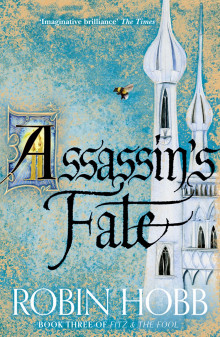 Assassin's Fate
Assassin's Fate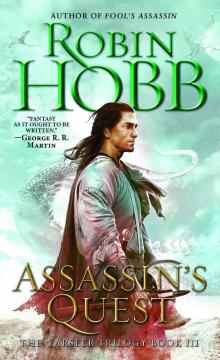 Assassins Quest
Assassins Quest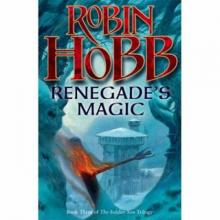 Renegades Magic
Renegades Magic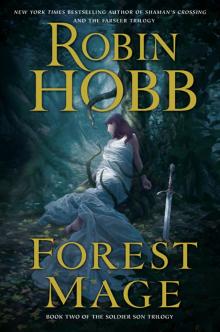 Forest Mage
Forest Mage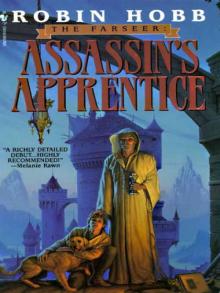 Assassin's Apprentice tft-1
Assassin's Apprentice tft-1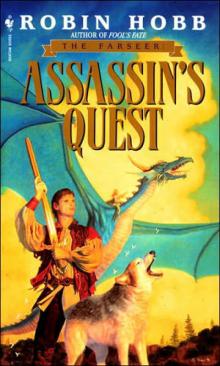 Assassin's Quest tft-3
Assassin's Quest tft-3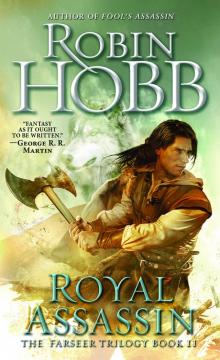 Royal Assassin
Royal Assassin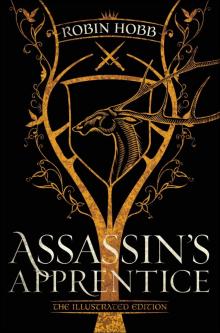 Assassin's Apprentice (The Illustrated Edition)
Assassin's Apprentice (The Illustrated Edition)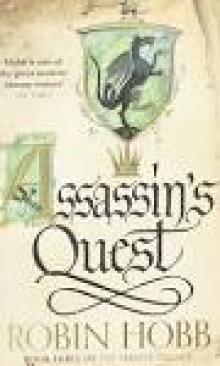 Assassin's Quest (UK)
Assassin's Quest (UK)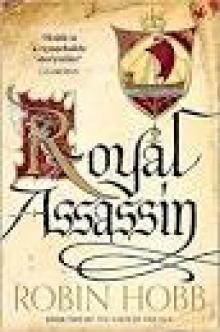 Royal Assassin (UK)
Royal Assassin (UK)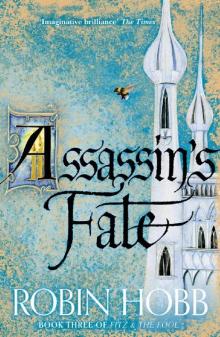 FF3 Assassin’s Fate
FF3 Assassin’s Fate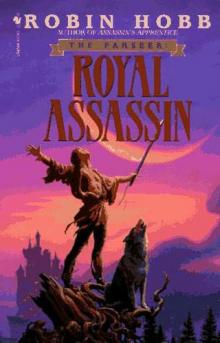 Royal Assassin tft-2
Royal Assassin tft-2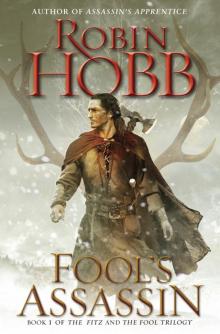 Fool’s Assassin: Book One of the Fitz and the Fool Trilogy
Fool’s Assassin: Book One of the Fitz and the Fool Trilogy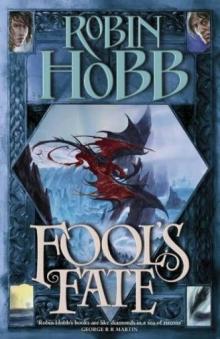 Fool's Fate ttm-3
Fool's Fate ttm-3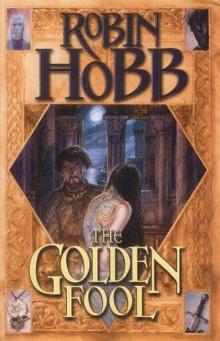 The Golden Fool ttm-2
The Golden Fool ttm-2 The Liveship Traders Series
The Liveship Traders Series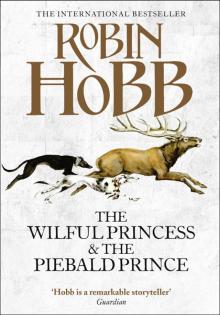 The Wilful Princess and the Piebald Prince
The Wilful Princess and the Piebald Prince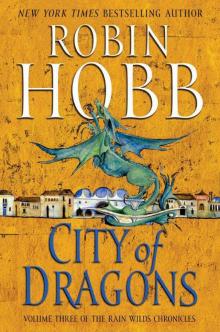 City of Dragons rwc-3
City of Dragons rwc-3 The Tawny Man 1 - Fool's Errand
The Tawny Man 1 - Fool's Errand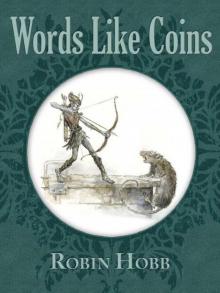 Words Like Coins
Words Like Coins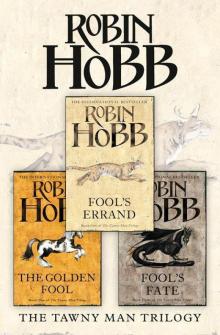 The Complete Tawny Man Trilogy Omnibus
The Complete Tawny Man Trilogy Omnibus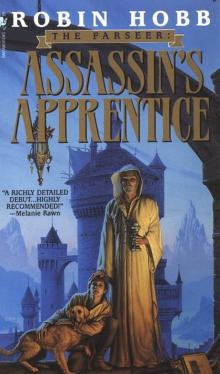 Farseer 1 - Assassin's Apprentice
Farseer 1 - Assassin's Apprentice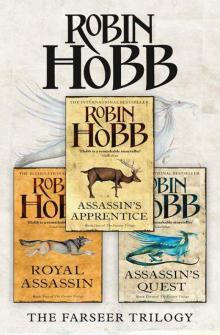 The Complete Farseer Trilogy Omnibus
The Complete Farseer Trilogy Omnibus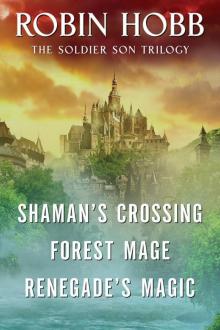 The Soldier Son Trilogy Bundle
The Soldier Son Trilogy Bundle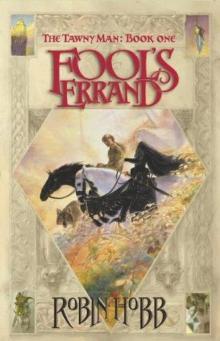 Fool's Errand ttm-1
Fool's Errand ttm-1 Blue Boots
Blue Boots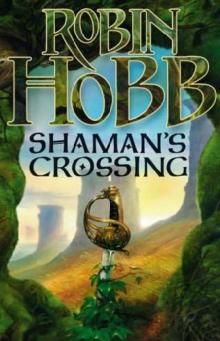 Shaman's Crossing ss-1
Shaman's Crossing ss-1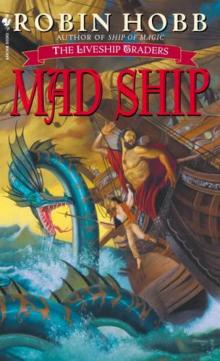 Mad Ship
Mad Ship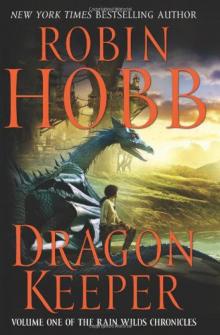 Dragon Keeper
Dragon Keeper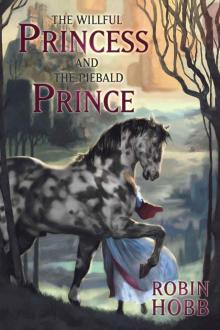 The Willful Princess and the Piebald Prince
The Willful Princess and the Piebald Prince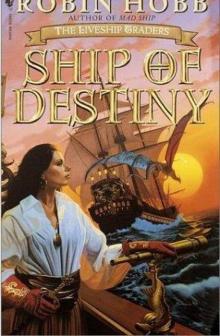 Ship of Destiny tlt-3
Ship of Destiny tlt-3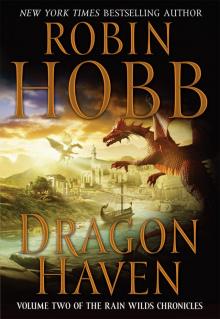 Rain Wild Chronicles 02 - Dragon Haven
Rain Wild Chronicles 02 - Dragon Haven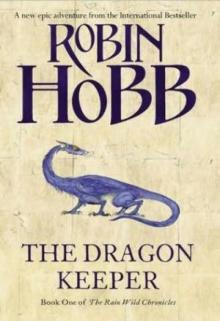 The Dragon Keeper trwc-1
The Dragon Keeper trwc-1 The Triumph
The Triumph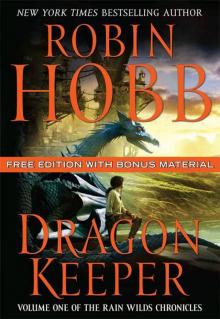 Dragon Keeper Free Edition with Bonus Material
Dragon Keeper Free Edition with Bonus Material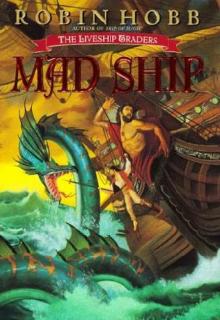 Mad Ship tlt-2
Mad Ship tlt-2 The Inheritance and Other Stories
The Inheritance and Other Stories Tawny Man 02 - Golden Fool
Tawny Man 02 - Golden Fool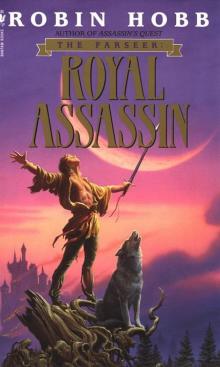 Farseer 2 - Royal Assassin
Farseer 2 - Royal Assassin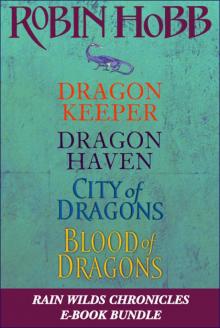 Rain Wilds Chronicles
Rain Wilds Chronicles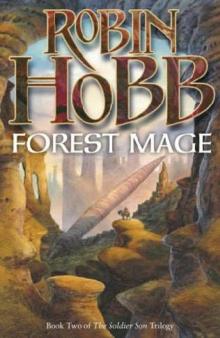 Forest Mage ss-2
Forest Mage ss-2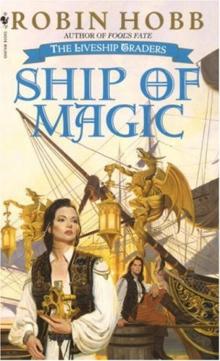 Ship of Magic lt-1
Ship of Magic lt-1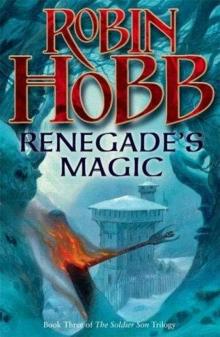 Renegade's Magic ss-3
Renegade's Magic ss-3